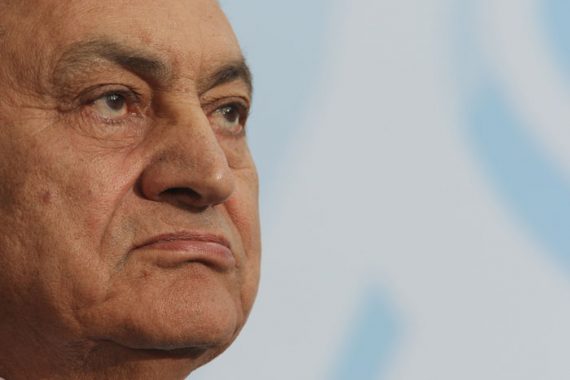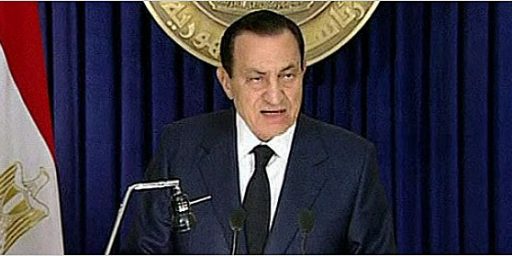Mubarak Out? Yes, But Not Necessarily Right Away
Hosni Mubarak may hang on to some semblance of power longer than many expected in the middle of last weeks chaos, mostly because there are few other alternatives right now.
There are signs that the passions in Egypt that were demanding the immediate departure of Hosni Mubarak are beginning to cool:
CAIRO – The main Egyptian opposition groups eased up on their insistence that President Hosni Mubarak step down immediately, agreeing instead on Sunday to join in talks toward overhauling the country’s political system at a more gradual pace while Mubarak remains in office.
The shift suggested that Mubarak and his allies may have succeeded in defusing the fiercest of cries from opponents who had insisted that the president resign as a precondition for any talks. It followed the clearest signals yet from the Obama administration that its call for a quick transition in Egypt did not include a demand that Mubarak step aside before elections this fall.
Among those who joined for the first time in talks with Omar Suleiman, Mubarak’s newly appointed vice president, were leaders from the banned Muslim Brotherhood movement, along with a loose coalition of political parties, intellectuals and protest organizers. Suleiman said the government would agree to consider broad changes, including constitutional amendments and a possible end to Egypt’s three-decade-old state of emergency.
While the meeting itself was a concession to opposition groups, the setting underscored who remains in charge. The parties gathered around a formal, oval-shaped table as a portrait of Mubarak gazed down on them.
In a television interview, Suleiman made it clear that the government’s willingness to consider the changes was based on an expectation that Mubarak would stay in charge during a drawn-out transition to a new government. Mubarak has insisted that he will not leave before his term ends in September.
“If President Mubarak would say that ‘I’m leaving now,’ who would take over?” Suleiman said on ABC. “I think with this atmosphere, that means that the other people who have their own agenda will make instability in our country.”
Similarly, the rhetoric from the United States has changed subtly from “now means yesterday” message that we were sending to Mubarak last week:
MUNICH — Secretary of State Hillary Rodham Clinton warned on Sunday that removing President Hosni Mubarak of Egypt too hastily could threaten the country’s transition to democracy.
Her remarks were the Obama administration’s most explicit sign yet of its growing emphasis on averting instability in Egypt, even at the expense of the key demand from the Egyptian protest movement: Mr. Mubarak’s immediate removal.
Citing the Egyptian Constitution, Mrs. Clinton said that if Mr. Mubarak stepped down now, Egypt would have to hold elections for a new president in 60 days — too little time for the government or the opposition to organize a credible vote.
Her comments, made to reporters on the way home from a conference in Munich, echo what administration officials have said privately and some of what the White House’s temporary diplomatic emissary to Cairo, Frank G. Wisner, said publicly on Sunday: Mr. Mubarak is likely to remain in the picture, at least a while longer.
Mrs. Clinton reiterated that Mr. Mubarak’s future was up to the Egyptian people and declined to discuss what role he should play between now and September, when Egypt is scheduled to hold an election in which he has said neither he nor his son Gamal will compete.
But Mr. Mubarak’s resignation now would set off a chain of events, Mrs. Clinton said. Under the Constitution — a document she conceded not having thought about before this week — the speaker of Parliament would step in as a caretaker president, followed by quick elections.
“Now the Egyptians are the ones who are having to grapple with the reality of what they must do,” she said, noting that opposition leaders, including Mohamed ElBaradei, had also talked about the need for time. “That’s not us saying it; that’s the Egyptians saying it,” Mrs. Clinton said.
Meanwhile, the protests continue but the edge seems to be off for the moment. Egypt is slowly trying to recover from last week’s chaos, many people need to get back to work, and sheer fatigue may be setting him. So, the idea of a long term solution that keeps Mubarak in power, even only as a figurehead, for a short period of time may not be as objectionable to opposition leaders as it was last week. At the same time, the U.S. is wise to tread carefully here. Unlike other nations — for example the downfall of Ferdinand Marcos in The Philippines — there isn’t an organized opposition political movement ready to take power from Mubarak and the NDP (although the idea that what we’re really witnessing here is a de facto military coup does have some merit). Allowing the transition to be an evolving process rather than an immediate jump in to the unknown would seem to be the wise thing to do, and if the U.S. can guide the process in that direction, we would likely be doing the best thing we could in this situation.
UPDATE (James Joyner): I have some related thoughts at New Atlanticist filed under “Frank Wisner on Mubarak: Gaffe or Conflict of Interest?” Especially relevant:
The much more likely scenario is that Wisner simply committed a classic “Kinsley gaffe,” named after the journalist Michael Kinsley, who once quipped that “A gaffe is when a politician tells the truth.”
In this case, Wisner was almost certainly saying exactly what was on the minds of every foreign policy player in the Obama administration — yet precisely what they were taking great pains not to actually say in public.
Precisely because Egypt is not a liberal democracy and because Mubarak and his predecessors have been so effective at suppressing opposition parties, there is no existing institutional framework for a smooth power transition. As much as we would all like to see “free and fair elections” take place this afternoon and a Swedeneque government in power tomorrow morning, it’s not going to happen. So, Mubarak’s recognition that his legacy is best served by benevolently presiding over a power transition for the next few months is the least bad outcome.
But hard truths are often best left unspoken. The United States government can’t very well come out and tell people protesting a repressive regime to be patient with the dictator a little while longer, so it carefully issues statements about nonviolence, the rule of law, respect for democracy, and all the rest without quite saying what the policy will be. Perhaps, freed from the shackles of diplomacy, Wisner wanted to play it straight just one time. Alas, it wasn’t helpful.
More at the link.







These are so unpredictable. At first he’s going then he’s staying and tomorrow something may ignite fervor and he’s on the way out once again. The army may flex it’s muscles or it may not. Mubarak may very see the end is coming and just take off with a plane full of gold and diamonds to retire on the French Riviera. Who knows?
The thing is we need to communicate our concerns without pushing an agenda to hard. So far it appears the Administration has lost control and is looking amateurish. Better to keep quite and thought a fool than to speak and remove all doubt. Haven’t they learned that? Boilerplate with the words peaceful, nonviolent, respect, and democracy would do us fine for now. Behind the scenes we need to stop the Muslim Brotherhood from turning this thing ugly.